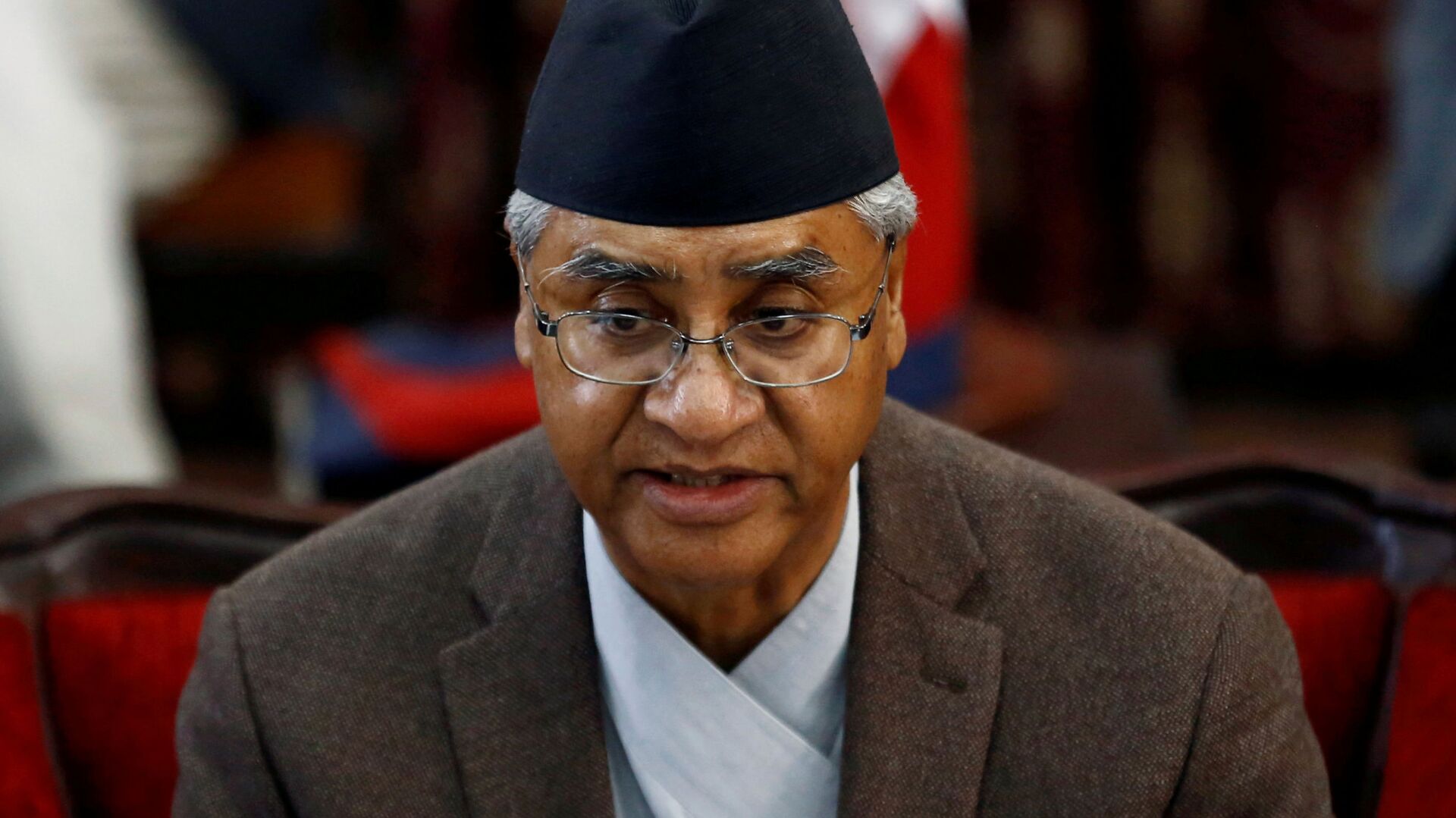https://sputnikglobe.com/20220615/nepals-plan-to-sign-us-pact-triggers-protests-as-opposition-warns-deuba-of-strategic-consequences-1096341332.html
Nepal's Plan to Sign US Pact Triggers Protests as Opposition Warns Deuba of Strategic Consequences
Nepal's Plan to Sign US Pact Triggers Protests as Opposition Warns Deuba of Strategic Consequences
Sputnik International
The Sher Bahadur Deuba government had secured parliamentary approval for the US government's $500 million Millennium Challenge Corporation (MCC) pact last... 15.06.2022, Sputnik International
2022-06-15T13:50+0000
2022-06-15T13:50+0000
2022-10-19T20:02+0000
nepal
millennium challenge corporation
strategic partnership
pentagon
us
sher bahadur deuba
us indo-pacific command
indo-pacific
sputnik
https://cdn1.img.sputnikglobe.com/img/07e5/07/0c/1083367754_0:229:2829:1820_1920x0_80_0_0_1e28c90ba2b9fa6be4adc209c28cb8b9.jpg
Nepal's opposition parties have launched a scathing attack on Prime Minister Sher Bahadur Deuba, accusing him of pushing the country into a "geopolitical conflict" by signing the US State Partnership Program (SPP).Former foreign minister Pradeep Gyawali, a senior politician of the Marxist-Leninist main opposition party CPN-UML warned the government of the strategic consequences of joining the SPP, a key US security cooperation tool, "facilitating cooperation across all aspects of international civil-military affairs".The former foreign minister said that the US had proposed the SPP during his tenure under the KP Sharma Oli government, but he kept it on hold for studying.Deuba's Nepali Congress General Secretary Gagan Thapa, in his turn, said the prime minister must clarify that Nepal will not sign the SPP. The controversy began days after Commanding General of the US Army Pacific Charles Flynn met Nepal's top leadership in Kathmandu, reportedly urging the Deuba government to join the SPP, and offered military assistance.Nepalese media also published the SPP document, shared with the Deuba government in April, weeks after Nepal ratified the $500-million Millennium Challenge Corporation (MCC).Nepal's opposition argued that the MCC grant incorporates a security component, a claim denied by Washington on many occasions.Nepal Army Chief General Prabhu Ram Sharma is scheduled to visit Washington for three days beginning on 29 June at the invitation of the Pentagon to discuss military cooperation.Meanwhile, the US embassy in Nepal has tried to douse the controversy, claiming the SPP is an exchange program between an American state's National Guard and a partner foreign country. "The US National Guard domestically supports US first responders in dealing with natural disasters, such as earthquakes, floods, and wildfires," it said.However, the National Guard website defines the objective of the SPP as a way to facilitate "military-to-military engagements in support of defence security goals." The SPP has existed for over 25 years and includes over 80 partnerships with over 90 countries.
nepal
indo-pacific
Sputnik International
feedback@sputniknews.com
+74956456601
MIA „Rossiya Segodnya“
2022
Rishikesh Kumar
https://cdn1.img.sputnikglobe.com/img/07e4/08/04/1080055820_0:0:388:389_100x100_80_0_0_40018ee210946d65d49ffba4f4c008e1.jpg
Rishikesh Kumar
https://cdn1.img.sputnikglobe.com/img/07e4/08/04/1080055820_0:0:388:389_100x100_80_0_0_40018ee210946d65d49ffba4f4c008e1.jpg
News
en_EN
Sputnik International
feedback@sputniknews.com
+74956456601
MIA „Rossiya Segodnya“
Sputnik International
feedback@sputniknews.com
+74956456601
MIA „Rossiya Segodnya“
Rishikesh Kumar
https://cdn1.img.sputnikglobe.com/img/07e4/08/04/1080055820_0:0:388:389_100x100_80_0_0_40018ee210946d65d49ffba4f4c008e1.jpg
nepal, millennium challenge corporation, strategic partnership, pentagon, us, sher bahadur deuba, us indo-pacific command, indo-pacific, sputnik
nepal, millennium challenge corporation, strategic partnership, pentagon, us, sher bahadur deuba, us indo-pacific command, indo-pacific, sputnik
Nepal's Plan to Sign US Pact Triggers Protests as Opposition Warns Deuba of Strategic Consequences
13:50 GMT 15.06.2022 (Updated: 20:02 GMT 19.10.2022) The Sher Bahadur Deuba government had secured parliamentary approval for the US government's $500 million Millennium Challenge Corporation (MCC) pact last February despite massive street protests. Fresh controversy started on Tuesday following a leak claiming the Deuba government is set to sign a military deal with the US.
Nepal's opposition parties have launched a scathing attack on Prime Minister Sher Bahadur Deuba, accusing him of pushing the country into a "geopolitical conflict" by signing the US State Partnership Program (SPP).
Former foreign minister Pradeep Gyawali, a senior politician of the Marxist-Leninist main opposition party CPN-UML warned the government of the strategic consequences of joining the SPP, a key US security cooperation tool, "facilitating cooperation across all aspects of international civil-military affairs".
"The draft proposal of the SPP has raised serious concerns. Nepal's foreign policy will be breached if it decides to be part of any military alliance," Gyawali said, demanding an immediate clarification in the parliament about PM Deuba's impending visit to the US.
The former foreign minister said that the US had proposed the SPP during his tenure under the KP Sharma Oli government, but he kept it on hold for studying.
Deuba's Nepali Congress General Secretary Gagan Thapa, in his turn, said the prime minister must clarify that Nepal will not sign the SPP.
"When there are strategic interests, we should start away from powerful countries. This is not just my opinion; our constitution also says the same," Thapa said, explaining his party's views in the parliament.
The controversy began days after Commanding General of the US Army Pacific Charles Flynn met Nepal's top leadership in Kathmandu, reportedly
urging the Deuba government to join the SPP, and offered military assistance.
Nepalese media also published the SPP document, shared with the Deuba government in April, weeks after Nepal ratified the $500-million
Millennium Challenge Corporation (MCC).Nepal's opposition argued that the MCC grant incorporates a security component, a claim denied by Washington on many occasions.
Nepal Army Chief General Prabhu Ram Sharma is scheduled to visit Washington for three days beginning on 29 June at the invitation of the Pentagon to discuss military cooperation.
Meanwhile, the US embassy in Nepal has tried to douse the controversy, claiming the SPP is an exchange program between an American state's National Guard and a partner foreign country.
"The US National Guard domestically supports US first responders in dealing with natural disasters, such as earthquakes, floods, and wildfires," it said.
However, the National Guard website defines the objective of the SPP as a way to facilitate
"military-to-military engagements in support of defence security goals."
The SPP has existed for over 25 years and includes over 80 partnerships with over 90 countries.


